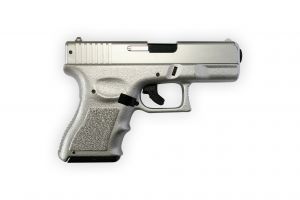If you live in New Jersey, and participate in target sports, or hunt, or have acquired a firearm for self protection, you may have familiarized yourself with the laws governing ownership of guns in the Garden State. You may also be feeling like your Second Amendment rights are being infringed. Well, you’re right. You see I’m not just a New Jersey gun attorney, I’m also a gun owner, and I am committed to protecting you from criminal prosecution of New Jersey’s Unconstitutional gun laws. A culture has proliferated in New Jersey, that says guns are bad. It’s gotten so bad even, that unbelievably the editorial board of the Star Ledger recently published an article which actually called for gun confiscation, from law abiding citizens, as was done in Australia. I guess they aren’t fans of the Second Amendment, or people’s rights.

Authored largely by James Madison, The Bill of Rights consists of the first 10 amendments to the Constitution. Ratified in 1791, these amendments were added to safeguard the personal freedoms Americans hold so dear. It was included to ease the fears of those who feared once again concentrating too much power in a central government (the Antifederalists). Freedom of speech, for example, is guaranteed by the First Amendment, which means you cannot be imprisoned for the things that you say. Freedom from unreasonable searches and seizures is guaranteed by the Fourth Amendment, and means law enforcement cannot enter your house without a warrant. Most defendants are intimately familiar with the Sixth Amendment, as it guarantees the right to a jury trial, and the right to retain an attorney, among others. Most consider these personal rights sacrosanct, and indeed they are interwoven into our attitudes as Americans, and into our very culture. We don’t question that we have these rights, the Constitution guarantees them. They are what make us free people.

Which brings us to the Second Amendment, which states, “A well regulated Militia, being necessary to the security of a free State, the right of the people to keep and bear Arms, shall not be infringed.” Debate has been raging about who the right applies to, as well as what exactly it protects. Second Amendment advocates assert that the amendment was intended to protect an individual’s right to keep and bear arms. Gun-control proponents argue the amendment applies to state controlled militias, and individuals do not have the right to own guns. An interesting theory considering it is listed in the Bill of Rights, which specifically enumerates only individual rights, making the inclusion of a state’s rights amendment totally out of place. The historical context within which the amendment was written, also strongly guides it’s logical interpretation. The colonists not only suffered greatly under the yolk of a tyrannical monarchy who maintained it’s oppressive power over the colonies through the use of a standing army, they had also just won their independence because civilians were able to take up their own arms and fight for what they believed in. Indisputably, history shows that the Framers of the Constitution weren’t big fans of powerful governments, nor were they in favor of standing armies. It makes logical sense that having just witnessed the successful revolt composed largely of armed civilians, that the Framers would wish to preserve the ability of the people to bear arms so they might always have the tools necessary to remain a free people. The Declaration of The Rights of The Inhabitants of The Commonwealth or State of Pennsylvania, penned in 1776, included language which encapsulated these sentiments perfectly. Article XIII states, “That the people have the right to bear arms for the defense of themselves or the state; And as standing armies in the time of peace are dangerous to liberty, they ought not to be kept up; and that the military should be kept under strict subordination to, and governed by, the civil power.“

In 2008, this is exactly the view the Supreme Court took when they decided District of Columbia, et. al. v. Heller. This landmark case held that the Second Amendment applies to individuals in federal enclaves, like Washington D.C., and protects their right to own a firearm for traditional lawful purposes, like self defense, within the home. Two years later in 2010, in McDonald v. Chicago the court held that right applies to individuals in states as well. Although these two cases have settled this important issue, they only covered half of the equation, conspicuously failing to specifically define the issue of individuals carrying firearm outside their homes. Considering the Second Amendment clearly states, “keep and bear arms”, this was viewed as a glaring omission by anti-gun activists. New Jersey anti-gun legislators took this ambiguity as an excuse to keep it’s draconian gun restrictions in place. In 2014 the petitioner in Drake v. Jerejian sought to get a ruling from the court on this very issue. Ironically, it was New Jersey’s own carry permit laws which were the subject of the petition. So important is this issue, that 19 other states sought permission from the court to file amicus curiae briefs in support of the petitioner. New Jersey is a “may issue” state for purposes of issuing carry permits to private individuals. New Jersey statute 13:54-2.3(a)3 requires an applicant to demonstrate a justifiable need in order to carry a handgun. Drake, the petitioner had a high risk job; stocking and picking up cash from ATMs. He carried large sums of cash, and drove his car from machine to machine, hoping not to be recognized as a potential target for robbery. Drake applied for a concealed carry permit, with the blessing of his local police chief, but was denied. As you see, despite having what is clearly a justifiable need, self defense, Drake was turned down. Self defense is not considered a justifiable need in New Jersey. Drake appealed the decision, but the third circuit court denied him. Despite the legal analysis provided in Heller and McDonald, the circuit court justified it’s decision by stating that New Jersey’s “justifiable need” requirement was valid because it was a long standing exception to the Second Amendment, and that there was no way legislators could have known they were burdening the Second Amendment when they passed the original law. That is tantamount to saying, even though the law violates the second amendment, because it’s always been the law, it’s still valid. I’ll let you in on a secret. This is not legal analysis. It is extra-judicial activism designed to produce a result which is politically or socially desired, not one which is consistent with the law. It says to the citizens of New Jersey, loud and clear, that legislators and judges don’t care about your Constitutionally guaranteed rights.
Many gun owners in New Jersey were waiting with bated breath for a decision by the Supreme Court in Drake. Alas, it was not to come. Inexplicably, the court denied certiorari, declining to accept the petition for review. For now, the third circuit decision stands, and New Jersey residents will have to continue to demonstrate an immediate justifiable need in order to acquire a carry permit. As soon as someone figures out what a justifiable need is, I’ll let you know. In the meantime, contemplate this statement from counsel for Drake; If you have to demonstrate a need to exercise a right, is it really a right?
Additional Resources:
Could Drake v. Jerejian Be The Next Big Gun Case? The New American, April 30, 2014
